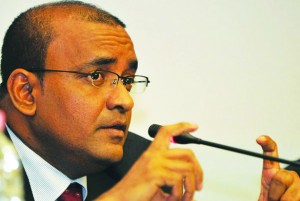President Donald Ramotar should seek answers about the credibility of China Harbour Engineering Company Limited, the contractor of the Cheddi Jagan International Airport (CJIA) whose parent company has been blacklisted by the World Bank, former President Bharrat Jagdeo has said.
Jagdeo made the comments to reporters in New York earlier this week amid swirling allegations of the integrity of the Chinese firm. Jagdeo said Ramotar should seek explanations from the Chinese government about the conduct of CHEC since it is state owned, the National Communications Network (NCN) reported.
The former president is also urging that President Ramotar review the CJIA contract to ascertain whether Guyana will be getting value for its money, and if there is any illegality in the project. The former president said on the basis of the explanations given, Ramotar should make a decision on the project’s feasibility. He also stressed that what is important, is that the new CJIA gets built, since its expansion is important to Guyana’s development. He said it is in this context, that it is important too, that Guyana secures the Chinese soft loan for the project.
The World Bank debarred China Communications Construction Company (CCCC), the parent company of China Harbour Engineering Company Limited, from being eligible to bid on road and bridge projects funded by the bank for the period 2009 to 2017.




